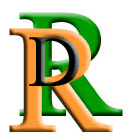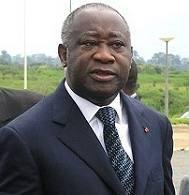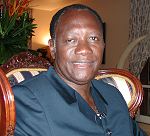Aimé Henri Konan Bédié is an Ivorian politician. He was President of Côte d'Ivoire from 1993 to 1999, and he is currently the President of the Democratic Party of Côte d'Ivoire - African Democratic Rally (PDCI-RDA).

The Rally of the Republicans is a liberal party in Ivory Coast. The party is the country's governing party; the party's leader, Alassane Ouattara, is the current President of Ivory Coast.

Alassane Dramane Ouattara is an Ivorian politician who has been President of Ivory Coast since 2010. An economist by profession, Ouattara worked for the International Monetary Fund (IMF) and the Central Bank of West African States, and he was the Prime Minister of Côte d'Ivoire from November 1990 to December 1993, appointed to that post by President Félix Houphouët-Boigny. Ouattara became the President of the Rally of the Republicans (RDR), an Ivorian political party, in 1999.

The Ivorian Party of Workers is a centre-left, democratic socialist and social democratic, political party in Ivory Coast. It is led by Francis Wodié and was founded on April 8, 1990.
The Movement of the Forces of the Future is a political party in Côte d'Ivoire. The MFA was founded by Innocent Anaky in December 1992.

Presidential elections were held in Ivory Coast in 2010. The first round was held on 31 October, and a second round, in which President Laurent Gbagbo faced opposition leader Alassane Ouattara, was held on 28 November 2010. Originally scheduled to be held in 2005, the vote was delayed several times due to the Ivorian Civil War and difficulties involved in the organization and preparation of the elections. A peace agreement between the government and the former rebel New Forces was signed on 4 March 2007, and in late April 2009, it was announced that the elections would be held by 6 December 2009, and that the date would be announced shortly. On 15 May 2009, the date was announced to be 29 November 2009. On 11 November, the elections were postponed again due to delays in the electoral roll. It was announced on 3 December 2009 to be held in late February or early March 2010.

Presidential elections were held in Ivory Coast on 22 October 2000. Robert Guéï, who headed a transitional military regime following the December 1999 coup d'état, stood as a candidate in the election. All of the major opposition candidates except for Laurent Gbagbo of the Ivorian Popular Front (FPI) were barred from standing. The Rally of the Republicans (RDR) and Democratic Party of Côte d'Ivoire – African Democratic Rally (PDCI-RCA) boycotted the election in response to the exclusion of their candidates by the Supreme Court.

General elections were held in Ivory Coast on 27 November 1960 to elect a President and National Assembly. Under the constitution enacted that year, the country was officially a one-party state with the Democratic Party of Côte d'Ivoire – African Democratic Rally (PDCI-RDA) as the sole legal party. Its leader, Félix Houphouët-Boigny, was automatically elected to a five-year term as president and unanimously confirmed in office via a referendum. A single list of PDCI-RDA candidates won all 70 seats in the National Assembly. Voter turnout was 95.9% in the parliamentary election and 98.8% in the presidential election.

General elections were held in Ivory Coast on 7 November 1965 to elect a President and National Assembly. At the time the country was a one-party state with the Democratic Party of Côte d'Ivoire – African Democratic Rally (PDCI-RDA) as the sole legal party. Its leader Félix Houphouët-Boigny was elected President unopposed, whilst the PDCI-RDA won all 85 seats in the National Assembly. Voter turnout was 99.6%.

General elections were held in Ivory Coast on 29 November 1970 to elect a President and National Assembly. At the time the country was a one-party state with the Democratic Party of Côte d'Ivoire – African Democratic Rally (PDCI-RDA) as the sole legal party. Its leader Félix Houphouët-Boigny was elected President unopposed, whilst in the National Assembly election, a list of 100 PDCI-RDA candidates for the 100 seats was presented to the electorate for approval. Voter turnout was reported to be 98.9% in the parliamentary election and 99.2% in the presidential election.

General elections were held in Ivory Coast on 16 November 1975 to elect a President and National Assembly. At the time the country was a one-party state with the Democratic Party of Côte d'Ivoire – African Democratic Rally (PDCI-RDA) as the sole legal party. Its leader Félix Houphouët-Boigny was elected President unopposed, whilst in the National Assembly election the PDCI-RDA won all 120 seats. Voter turnout was reported to be 99.3% in the parliamentary election and 99.8% in the presidential election.

Parliamentary elections were held in Ivory Coast on 10 November 1985. At the time the country was a one-party state with the Democratic Party of Côte d'Ivoire – African Democratic Rally (PDCI-RDA) as the sole legal party. 546 PDCI-RDA candidates contested the 175 seats. Voter turnout was reported to be just 45.7%.

Presidential elections were held in Ivory Coast on 27 October 1985. At the time the country was a one-party state with the Democratic Party of Côte d'Ivoire – African Democratic Rally as the sole legal party. Its leader, long-term President Félix Houphouët-Boigny was the only candidate, and was re-elected unopposed.

Parliamentary elections were held in Ivory Coast on 25 November 1990, the first since the restoration of multi-party democracy earlier in the year. Although 17 of the 25 legalised parties ran in the election, nearly half of the 490 candidates were from the former sole legal party, the Democratic Party of Côte d'Ivoire – African Democratic Rally (PDCI). The PDCI won a landslide victory, taking 163 of 175 seats on 71.7 percent of the vote. Only two other parties got into the legislature, winning just 12 seats between them. Voter turnout was reported to be around 40%.

Parliamentary elections were held in Ivory Coast on 26 November 1995. Ten parties and a number of independents contested the election, with the Rally of the Republicans and the Ivorian Popular Front running under the Republican Front banner. The result was a victory for the ruling Democratic Party of Côte d'Ivoire – African Democratic Rally (PDCI-RDA), which won 148 of the 175 seats.

United Nations Security Council Resolution 1962, adopted unanimously on December 20, 2010, after recalling previous resolutions on the situation in Côte d'Ivoire, including resolutions 1893 (2009), 1911 (2010), 1924 (2010), 1933 (2010), 1942 (2010), 1946 (2010) and 1951 (2010), the Council extended the mandate of the United Nations Operation in Côte d'Ivoire (UNOCI) until June 30, 2011 and urged all Ivorian parties to respect the outcome of the presidential election and the recognition of Alassane Ouattara as President.

Jeannot Ahoussou-Kouadio is an Ivorian politician who was Prime Minister of Ivory Coast from March 2012 to November 2012. Previously he was Minister of Industry from 2002 to 2005 and Minister of Justice from 2010 to 2012.

A constitutional referendum was held in Ivory Coast on 30 October 2016. Voters were asked whether they approve of a proposed new constitution. The new constitution would create a Senate, remove the nationality clause from the presidential requirements and establish the post of Vice-President. The constitution was approved by 93.42% of votes with a 42.42% turnout, as announced by the president of the Independent Electoral Commission (CEI).

The Vice President of the Republic of Ivory Coast, officially the Republic of Côte d'Ivoire, is the second-highest executive official in Ivory Coast. The Vice President, together with the President of Ivory Coast, is directly elected by the people through popular vote to serve a five-year term of office. The Vice President is the first person in the presidential line of succession and would ascend to the presidency upon the death or resignation of the President, or an absolute vacancy in the office. President Alassane Ouattara appointed Daniel Kablan Duncan as Vice President in January 2017 after the 2016 Constitution was enacted.










